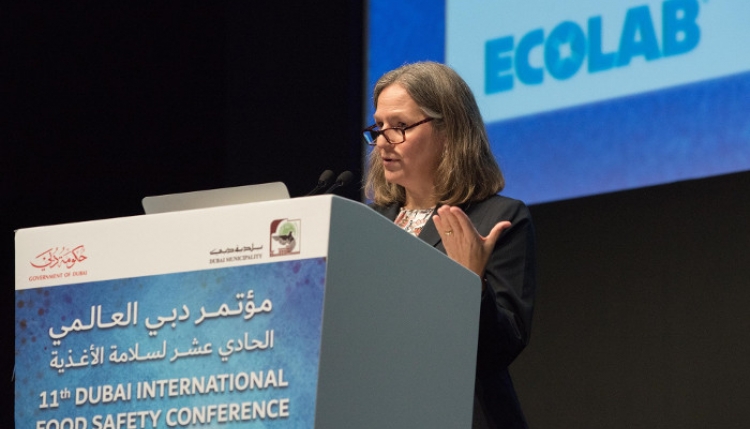Dr. Ruth Petran, one of the world’s foremost leaders in food safety, has revealed the adoption of new technologies such as the Internet of Things (IoT) Big Data and Data Science will ensure food safety, improve sustainability and help “bury the food bug”.
Petran, the Vice President of Food Safety and Public Health at Ecolab Inc., was speaking to a gathering of regional food safety champions at the 2017 Dubai International Food Safety Conference, organised by Dubai Municipality and held today at Dubai World Trade Centre (DWTC).
“Data is a powerful tool for monitoring, controlling and verifying the causes and issues that lead to foodborne diseases,” said Dr. Petran. “Mitigating food safety risks requires a holistic approach, from considering sustainability or questions surrounding local sourcing, to the inherent logistic complexities of today’s global supply chain. Ecolab has developed solutions that use digitization and data intelligence to construct strong, sustainable food safety programs – these solutions can help us, as an industry, bury the food safety bug once and for all.”
With foodborne illnesses responsible for 420,000 deaths a year worldwide, according to the World Health Organization (WHO), Ecolab Inc. - the global leader in water, hygiene and energy technology services - has partnered with Dubai Municipality for this year’s Conference to explore how new digital technologies are impacting global food safety.
Although foodborne diseases rank amongst the global community’s most preventable illnesses, a recent WHO report reveals that almost one in 10 people contract a food-related illness every year. Astonishingly, the loss of otherwise healthy life years attributed to premature death and disability caused by food-related illness is 33 million years annually.
As the global public health concern deepens, Ecolab is leading the way in exploring or adopting increasingly sophisticated digital tools and platforms to meet the challenges of food safety. The organisation helps to ensure the quality and safety of more than a quarter (27%) of the world’s processed food at 5,000 food and beverage plants around the world every year. The company also helps support kitchens serving 45 billion restaurant meals and helps clean 31 billion hands per year with its hand hygiene solutions.
As one of the world’s most respected voices in food safety, Dr. Petran used her address to discuss using data to identify valid controls, and how to pull relevant insights to drive food safety and ensure focus on relevant global risks. Dr. Petran revealed how clean environments, safe food, visibility and compliance, and training and awareness are all key components within a strong food safety program, and underlined the importance of understanding how the complex connections between these elements can impact food safety and quality.
“As the Middle East’s food service trends place greater emphasis on new technology adoption, the role of data as a tool to help stakeholders properly address hazards and verify the effectiveness of food safety programs has never been more prevalent,” added Dr. Petran. “Ecolab and Dubai Municipality will work closely together to support safety initiatives across the region.”
Noura Al Shamsi, Head of Permits and Applied Nutrition Section at Dubai Municipality and Chairperson of Dubai International Food Safety Conference added: “Dubai Municipality’s Food Safety Department is committed to the protection of public health and this year’s International Food Safety Conference is a timely and important platform for exploring opportunities to optimize food safety using the latest technologies and innovative solutions such as data analytics. Ecolab’s role as strategic programme partner of the Conference adds tremendous value and expertise to our collective exploration of opportunities to enhance food safety methods across a wide stakeholder group of industry professionals, regulators, academics, policy-makers and students.”

